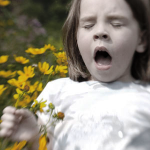Tis the season for allergies. The following post contains information from the USA.gov site on managing and treating seasonal allergies in children.
 Millions of people suffer from allergies every spring, including many children. In fact, according to the National Institute of Allergy and Infectious Diseases, about 40 percent of children in the United States suffer from allergic rhinitis, also known as hay fever.
Millions of people suffer from allergies every spring, including many children. In fact, according to the National Institute of Allergy and Infectious Diseases, about 40 percent of children in the United States suffer from allergic rhinitis, also known as hay fever.
Hay fever is triggered by breathing in allergens, like pollen, commonly found in springtime air. Sneezing and nasal congestion are some of the most common symptoms, but your symptoms can vary depending on the types of plants that grow where you live.
The following tips will help you minimize seasonal allergies in children, and learn more about allergy treatments.
How to Prevent Allergies in Children
If your child suffers from seasonal allergies, there are steps you can take to reduce their symptoms and decrease the use of medications:
- During the spring, keep your children indoors in the evenings because pollen levels are highest during that time of day.
- Keep your home and car windows closed during windy, sunny days.
- Have your children take a shower after spending time outside to remove any pollen residue on their body or in their hair.
- Have your children change their clothes after spending time outside because they will carry pollen indoors on their clothes.
- Dry your clothes indoors instead of on an outdoor clothesline during this time of year.
Allergy Medicine for Children
Medicine can help alleviate allergy symptoms in children, but with any medication you give your child, be sure you’re using the right medication for your child’s age and weight. Follow the instructions carefully to be sure your child gets the correct dosage.
Over-the-counter, generic allergy medication is effective for many people and can cost less than prescription allergy medications. If you have any questions about what medications are right for your child, ask your family doctor.
Some common allergy medications include:
- Nasal decongestants to relieve a stuffy nose.
- Antihistamines to relieve sneezing, and an itchy, runny nose.
- Nasal corticosteroids are also often used, but are available only by prescription.
Other Treatments
For children who have allergy symptoms that are difficult to control, doctors will often give your child an allergy test to learn the exact cause of the allergy. Your doctor will recommend a special treatment based on the results of the allergy test.
Your child need not suffer from seasonal allergies.
Pocket
